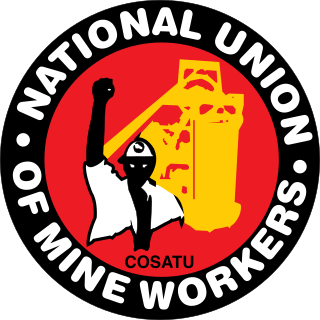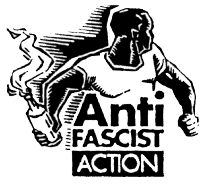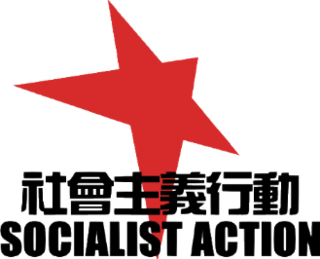Related Research Articles

Socialism in New Zealand had little traction in early colonial New Zealand but developed as a political movement around the beginning of the 20th century. Much of socialism's early growth was found in the labour movement.
The United Labour Party (ULP) of New Zealand was an early centre-left to left-wing political party. Founded in 1912, it represented the more moderate wing of the labour movement. In 1916 it joined with other political groups to establish the modern Labour Party.
Lonmin plc, formerly Lonrho plc, was a British producer of platinum group metals operating in the Bushveld Complex of South Africa. It was listed on the London Stock Exchange. Its registered office was in London, and its operational headquarters were in Johannesburg, South Africa.

The National Union of Mineworkers (NUM) is a mainly mining industry related trade union, an organisation of workers with common goals through organised labour, in South Africa. With a membership of 300,000 as of 2014, it is the largest affiliate of the Congress of South African Trade Unions (COSATU).

Anti-Fascist Action (AFA) was a militant anti-fascist organisation, founded in the UK in 1985 by a wide range of anti-racist and anti-fascist organisations.
South Africa has been dubbed "the protest capital of the world", with one of the highest rates of public protests in the world.
The Democratic Left Front was formed as a non-sectarian and non-authoritarian anti-capitalist front in South Africa. It was formed from the Conference for a Democratic Left launched in 2008, at an event held in Johannesburg in January 2011. It played a role in solidarity campaigns, most notably concerning the Marikana massacre. With the rise of the United Front, and following divisions within the DLF, the formation disappeared.
The Constitution of South Africa protects all basic political freedoms. However, there have been many incidents of political repression, dating back to at least 2002, as well as threats of future repression in violation of this constitution leading some analysts, civil society organisations and popular movements to conclude that there is a new climate of political repression or a decline in political tolerance.

The Marikana massacre was the killing of thirty-four miners by the South African Police Service (SAPS) on 16 August 2012 during a six-week wildcat strike at the Lonmin platinum mine at Marikana near Rustenburg in South Africa's North West province. The massacre constituted the most lethal use of force by South African security forces against civilians since the Soweto uprising in 1976 and has been compared to the 1960 Sharpeville massacre.

The Association of Mineworkers and Construction Union (AMCU) was formed in Mpumalanga, South Africa, in 1998 as a breakaway faction of the COSATU-affiliated National Union of Mineworkers (NUM). It was formally registered as a union in 2001. According to Mining Weekly, the union sees itself as distinct from NUM in that it is "apolitical and noncommunist".
The International Marxist Group (IMG) was a Trotskyist group in Britain between 1968 and 1982. It was the British Section of the Fourth International. It had around 1,000 members and supporters in the late 1970s. In 1980, it had 682 members; by 1982, when it changed its name to the Socialist League, membership had fallen to 534.

The Workers and Socialist Party (WASP) is a Marxist and Trotskyist political party in South Africa affiliated to International Socialist Alternative.
The Anti-Nazi League (ANL) was an organisation set up in 1977 on the initiative of the Socialist Workers Party (SWP) with sponsorship from some trade unions and the endorsement of a list of prominent people to oppose the rise of far-right groups in the United Kingdom. It was wound down in 1981. It was relaunched in 1992, but merged into Unite Against Fascism in 2003.

Socialist Action is a Trotskyist political organisation in Hong Kong. It is affiliated with International Socialist Alternative (ISA) and works closely with the ISA sections in mainland China and Taiwan. It describes itself as being based on the method and analysis of Marxism, to politically re-arm and organise the working class in the fight for a socialist world. They oppose the Chinese Communist Party, which they claim has made China the 'Sweatshop of the World' with one of the most extreme wealth gaps on the planet. They stand for the creation of fighting independent trade unions by Chinese workers to fight against capitalist exploitation and authoritarian rule.

Sibanye-Stillwater is a multinational mining and metals processing Group with a diverse portfolio of mining and processing operations and projects and investments across five continents. The Group is also one of the foremost global PGM auto catalytic recyclers and has interests in leading mine tailings retreatment operations.
Nokulunga Primrose Sonti is a South African politician from the North West who served as a Member of the National Assembly of South Africa for the Economic Freedom Fighters from May 2014 until May 2024. Sonti was previously a member of the African National Congress.
The Movement for a Socialist Alternative (Nigeria) (MSA) is a Trotskyist political party in Nigeria. It is affiliated to International Socialist Alternative.

Richard J. T. Calland is a British-South African writer and political analyst. Until 2023 Calland was Associate Professor of Public Law at the University of Cape Town. He subsequently was appointed Adjunct Associate Professor at the Wits School of Government and a Fellow of the Cambridge Institute for Sustainability Leadership. He is a co-director of Sustainability Education and has been a columnist for the Mail & Guardian since 2001.
References
- ↑ "CWI-Worldwide |" . Retrieved 15 August 2024.
- 1 2 3 4 About Us - DSM
- ↑ The Labour Movement and the Nigerian condition, Vanguard , 9 May 2013.
- ↑ NIGERIA: JUNE 19 NATIONAL DAY OF ACTION Pambazuka News , 9 May 2013.
- ↑ 19 June, National Day of Action Archived 10 September 2014 at the Wayback Machine , Nigeria News Day, 9 May 2013.
- ↑ Nigerian Activists Protest Marikana Massacre Of Lonmin Miners, Sahara Reporters , 6 September 2012.
- ↑ Leftists Reject Neo-liberal Policies, Daily Independent .
- ↑ Lagos Chapter Quits NCP, Democratic Socialist Movement, 8 August 2007.
- ↑ In search of working class political party [usurped] , Daily Independent , 26 November 2013.